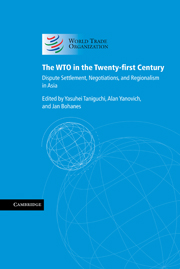Book contents
- Frontmatter
- Contents
- Notes on contributors
- Acknowledgements
- Table of dispute settlement cases and reports
- List of abbreviations
- Introduction
- PART I The WTO at Ten
- 1 The WTO's tenth anniversary
- 2 The WTO at ten: its multilateral and regional involvements
- PART II Accomplishments and Future Prospects of the WTO Dispute Settlement System
- PART III Asian Perspectives on WTO Dispute Settlement
- PART IV The Doha Development Agenda and Beyond
- PART V Asian Regional Integration and the Multilateral Trading System
- Index
1 - The WTO's tenth anniversary
from PART I - The WTO at Ten
Published online by Cambridge University Press: 05 March 2012
- Frontmatter
- Contents
- Notes on contributors
- Acknowledgements
- Table of dispute settlement cases and reports
- List of abbreviations
- Introduction
- PART I The WTO at Ten
- 1 The WTO's tenth anniversary
- 2 The WTO at ten: its multilateral and regional involvements
- PART II Accomplishments and Future Prospects of the WTO Dispute Settlement System
- PART III Asian Perspectives on WTO Dispute Settlement
- PART IV The Doha Development Agenda and Beyond
- PART V Asian Regional Integration and the Multilateral Trading System
- Index
Summary
The year 2005 marked the Tenth Anniversary of the World Trade Organization (WTO). The WTO was built on the multilateral trading system created under the auspices of the General Agreement on Tariffs and Trade (GATT), which dated back to 1947.
Japan was first admitted to the GATT in 1955, three years after the end of the allied occupation. I was then a university student living in very poor economic conditions that would be unimaginable for today's Japanese students. Japan has since risen from that lowly state to its present prosperity – thanks, of course, to the extraordinary effort of the Japanese people. However, we must not forget that Japan benefited from liberalized trade under the GATT, particularly after certain restrictions were lifted in the mid-1960s. Since then, Japan has enjoyed all of the benefits provided by the GATT/WTO.
Today, wherever we go in the world, we find many stores flooded with Japanese electronic products and streets filled with Japanese cars; we can easily buy bottles of good Scotch whisky in a neighbourhood liquor store at inexpensive prices. I used to buy Scotch and Cognac at the duty-free stores every time I went abroad. I never do now because I can buy these products in my own town, sometimes even cheaper than in the duty-free stores in foreign airports. This is thanks to the GATT and the WTO.
- Type
- Chapter
- Information
- The WTO in the Twenty-first CenturyDispute Settlement, Negotiations, and Regionalism in Asia, pp. 7 - 9Publisher: Cambridge University PressPrint publication year: 2007

